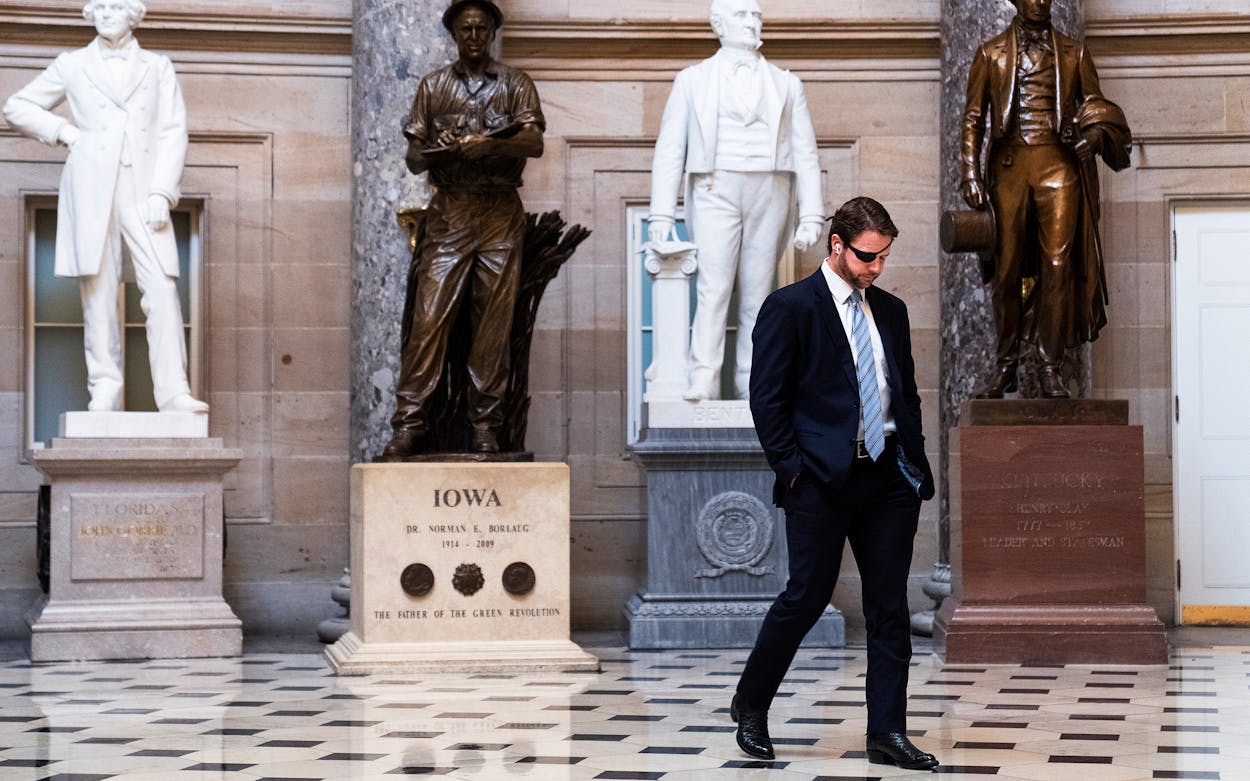Dan Crenshaw’s rise to political fame was an unlikely one. As a political newcomer running to replace longtime Congressman Ted Poe in 2018, he squeaked his way into second place in a crowded GOP primary by a mere 155 votes, forcing a runoff, and then winning his party’s nomination and claiming the seat. Then, famously, he appeared on Saturday Night Live just after he won the election to magnanimously accept an apology from Pete Davidson, who a week earlier had made fun of the eyepatch the representative has worn since sustaining injuries as a Navy SEAL in Afghanistan. That’s more national attention than most newly elected members of Congress can reasonably hope for, and Crenshaw rode the wave to become a young GOP superstar. But, as he learned this week, not every political foe is as easy to vanquish as Davidson, and there’s always someone younger ready to claim your spot. In this case, a child who stood maybe four feet tall.
On Monday, Crenshaw attended a biweekly tea party meeting at the Citizens Grill in Conroe, thirty minutes north of Houston. There, a girl identified by others in the video of the encounter as a ten-year-old, quoted a remark that Crenshaw had made in 2020 about “hero archetypes” on a podcast hosted by fellow Navy SEAL Jocko Willink. Discussing an idea he expounds on at length in his book, Fortitude, American Resilience in the Age of Outrage, Crenshaw had told the host, “We have societal hero archetypes that we look up to. Jesus is a hero archetype, Superman is a hero archetype. Real characters too, you know, I could name a thousand. Rosa Parks, Ronald Reagan, all of these people embody certain attributes that the American people think, ‘This is good.’”
The girl (who we anticipate will be speaking at CPAC next year) read the quote aloud to Crenshaw, accusing him of having “lied about being a Christian” and having heretically described Jesus as akin to the fictional Superman. Crenshaw, testily, responded, “Put a period after ‘Jesus’ and don’t question my faith,” resulting in an onslaught of boos and heckling from the crowd.
Theologians can attempt to parse whether Crenshaw was indeed questioning the historicity of Jesus on the podcast, and linguists whether he employed an imprecise simile. What the exchange undoubtedly highlights politically, however, is that the folks who should be the most fervent members of Crenshaw’s base—conservatives who are active enough in the party to attend biweekly meetings—are instead ones quick to shout at him. It doesn’t appear to be a fluke, either: at a GOP candidate forum last week, two Republicans running in Crenshaw’s district in the 2022 primary both received massive applause when they announced that they were challenging Crenshaw. They’re joined in the bid to unseat the representative by a third candidate whose Facebook page has attracted 3,200 followers under the campaign slogan “Fire Dan Crenshaw and Restore Liberty.” In 2020, Crenshaw ran unopposed in the GOP primary to retain his seat. So what’s changed?
For one, Crenshaw hasn’t toed every party line. He’s offered a fair amount of red meat to the GOP base—signing onto the Texas lawsuit that sought to change the outcome of the 2020 presidential election, and making a head-scratching ad in which he parachutes in to Georgia to personally hunt down “antifa”—but he’s also take a few stands against his party. He’s called the 43 House members in the ultra-conservative, tea party–affiliated Freedom Caucus “grifters” who tell “lie after lie after lie.” He published a Daily Wire column last year decrying his party’s emphasis on owning the libs. He pushed back against a heckler who insisted the election was stolen. And he recently called new GOP rising star representative Marjorie Taylor Greene of Georgia an “idiot” who’s running “a scam” in response to her claims of being censored on social media (he’d prefer she sign onto his bill rewriting Section 230 of the Telecommunications Decency Act “to prevent political censorship”).
All of that may have flown in the district Crenshaw represented in his first two terms, but redistricting put him in an unusual spot: Texas’s Second Congressional District was redrawn to turn a district Trump won by a single point in 2020 into one he’d have taken by 23 points, replacing the more competitive parts of Houston with the deep crimson of Montgomery County. As a result, Crenshaw is suddenly running to represent constituents who are significantly more conservative than the ones who voted him into office in his first two terms. The Second is among the safest GOP seats in the state for whoever wins the primary, in other words—but suddenly, that person might not be Dan Crenshaw.
Is he actually at risk? Crenshaw’s a powerhouse fund-raiser with a huge profile, but it’s clear that there’s a significant—and highly engaged—group of constituents who’ve found themselves newly drawn into his district who’d rather send their children out to accuse him of lying about his Christianity than applaud his magnanimity for appearing on SNL. Candidates in similar positions have occasionally lost primaries in upsets—just ask former House majority leader Eric Cantor, who got bounced out of his Virginia seat by a first-time candidate in 2014. Crenshaw’s going to need 50 percent of the vote to avoid a runoff in March’s four-way primary, and faces three candidates who get cheered like they just won the Astros another World Series just for announcing that they’re running against him.
There’s no polling on the race yet, but given that he went from squeaking into a runoff by 155 votes in 2018 to winning said runoff by 40 points, no one knows better than Crenshaw how wildly a low-turnout summer election can swing, if you rally the most passionate supporters. If those voters are activated this time, all the SNL appearances in the world might not be enough to save him.
- More About:
- Politics & Policy
- Dan Crenshaw








